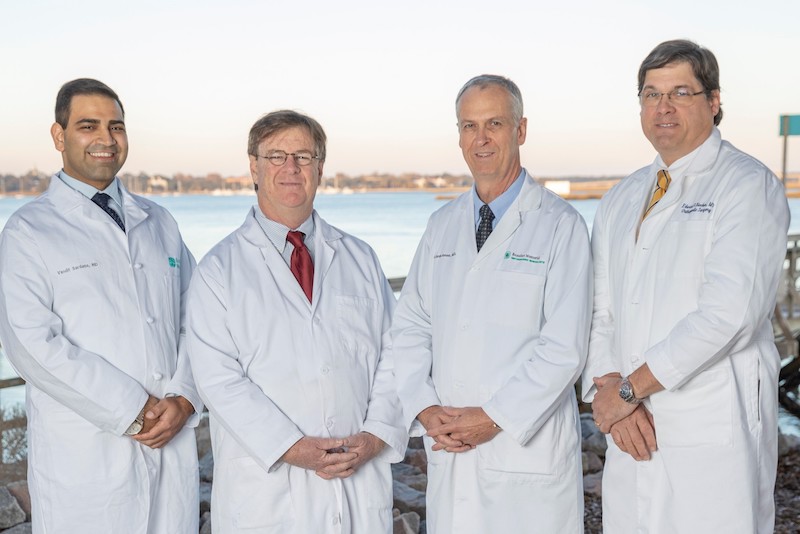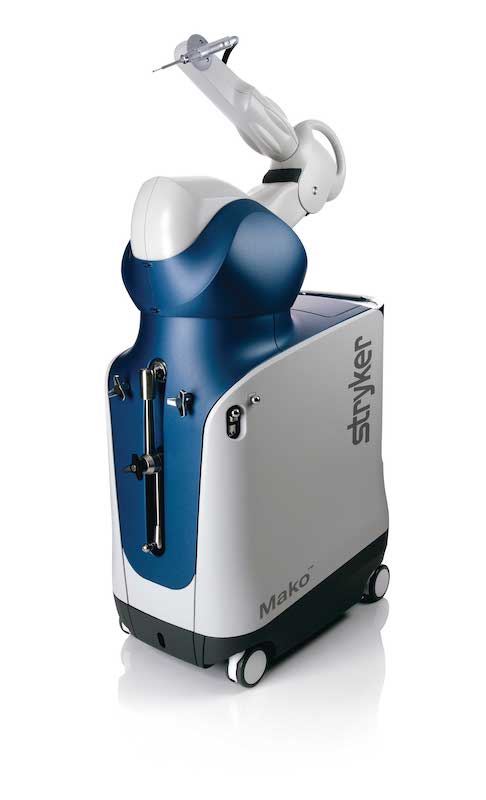
Following almost two years of highly successful knee replacements with the Mako Robotic Arm-Assisted Surgery System, Beaufort Memorial Hospital (BMH) is now offering the leading-edge technology for hip replacements, one of the most common elective orthopedic procedures in the U.S.
“The Mako robot has been a game changer for knee replacements,” said BMH board-certified orthopedic surgeon Dr. Kevin Jones, who has used the robotic technology to perform more than 200 total knee replacements. “The results have been amazing. Patients are recovering faster. We are now seeing a similar effect with hip replacements.”
With the advanced robotic system, orthopedic surgeons will now be able to implant the prosthetic hip components with greater precision resulting in a better functioning joint. “The Mako system has exceeded expectations,” said BMH orthopedic department chairman Dr. Edward Blocker, who performed the hospital’s first robotic knee replacement surgery in January 2020. “I’m very excited the technology has been perfected for hip replacement and we can now offer it to our patients.”
Clinical studies have shown the robotic surgery system improves outcomes by allowing the surgeon to customize the placement and alignment of hip implant components to the patient’s unique anatomy, providing more natural movement of the joint and reducing the risk of hip dislocation following surgery.
“We used to eyeball the placement of the prosthetic cup that goes in the hip socket,” said Jones, who performed the first robotic hip procedure at Beaufort Memorial last fall. “Now we can place it more accurately, which ensures optimal function and a more natural feel.”
Total hip replacement is typically recommended for patients suffering from advanced osteoarthritis, a degenerative disease that occurs when the cartilage cushioning the ball-and-socket joint wears away causing the rounded end of the thighbone to rub on the pelvis. The surgery involves removing the arthritic bone and damaged cartilage and replacing them with prosthetic implants designed to move like a healthy hip. Approximately 498,000 hip replacement procedures were performed in 2020 in the U.S. That number is expected to nearly triple by 2040.
Prior to surgery, a CT scan is taken of the hip joint to create a 3-D virtual model of the patient’s anatomy. The surgeon uses the model to evaluate bone structure, disease severity, joint alignment and the surrounding bone and tissue to determine the optimal size, placement and alignment of the implant components.

“Hip replacement has always been more art than science,” Blocker said. “With the robot, we can now map out the placement of the implant for the individual patient and see how it will function in all planes of motion.”
During the operation, the surgeon follows the preoperative plan, guiding the robotic instrument arm to remove only the diseased bone. A virtual boundary established by the robot prevents the surgeon from crossing the bone field into surrounding tissue, preserving the healthy bone and ligaments around it.
“I had great outcomes with the Mako hip replacement surgeries I performed during my fellowship,” said BMH board-certified orthopedic surgeon Dr. Vandit Sardana, who completed his training in joint replacement in 2018 at Lenox Hill Hospital in Manhattan. “Using the robot helps you position the joint components in the right position. With well-positioned hip components, there’s less likelihood of hip dislocation after the surgery.”
As with all robotic surgeries, the doctor is in control of the robot at all times during the surgery. “It’s important to understand that the Mako Robotic-Arm does not perform the actual surgery, make decisions on its own or move without the surgeon guiding it,” said BMH board-certified orthopedic surgeon Dr. Leland Stoddard. “I tell my patients that it’s still joint replacement surgery, and I’ll still be your surgeon. But the Mako provides the perfect combination of robotic precision and human knowledge, experience and touch.”
Beaufort Memorial physicians also are using minimally invasive “muscle-sparing” techniques, like the Direct Superior Approach, to improve hip replacement outcomes. With this technique, the surgeon avoids having to cut and then reattach the key muscle group that enables you to walk and bend. Less trauma to the hip’s surrounding muscle and ligaments can result in less pain following surgery and a faster recovery.
“Right now, about 60 percent of my hip replacement patients go home the same day,” Sardana said. “I hope to bump it up to 90 percent using the Mako surgery system.”
For more information on the procedure, visit BeaufortMemorial.org/MAKO or call (843) 522-7435.



